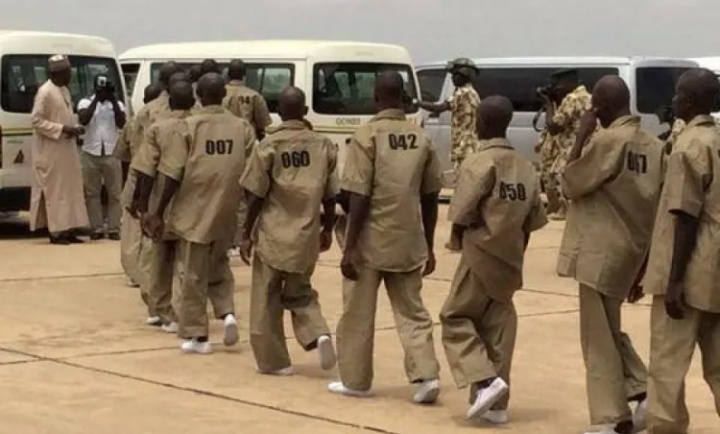No fewer than 2,168 repentant Boko Haram members have graduated from the Federal Government’s De-radicalisation, Rehabilitation and Reintegration, DRR, programme in Gombe State.
Col. Abiodun Johnson, the Commandant of the DRR Camp, Operation Safe Corridor, stated this on Thursday during a courtesy visit by the Borno Deputy Governor, Dr Usman Kadafur.
Mr Johnson said that the clients had passed through various rebuilding programmes and underwent series of medical screening, psychological and psycho-spiritual counseling, sports therapy, drug abuse counseling and western education programmes.
He said that during the six months programme, the clients were trained on vocational skills, including carpentry, cap knitting, shoe making, tailoring and electrification.
He explained that all the clients also ventured into farming in the camp as a compulsory trade, noting that the programme was divided into three phases; the initial documentation, initial medical test, intelligence profiling, NIMC profiling Biometrics and capturing.
“We are also doing categorisation to monitor different psychological points of mind of the client, which will give us the advantage of knowing the type of psychological first aid they will undergo.
“We also have the buy in process where everybody must accept that they will be part of the programme,” he said.
After the programme, the clients graduate with skills that enable them to become self-reliant, he further explained.
“The reintegration was done by partners in collaboration with community leaders. We also have feedback mechanism through our partners to find out what the clients are doing. So far, the feedback we are receiving is impressive, as they have been doing very well,” he stated.
He said that the repentant Boko Haram fighters swore an oath of allegiance to the Nigerian government before they were released back to their respective society.
Earlier, Mr Kadafur said that he was at the DRR camp as part of his familiarisation tour to get a first hand account on activities of the federal government DRR intervention.
The deputy governor, who doubles as the Chairman of the DRR in Borno, said that the state had received over 90,000 ex-militants under the programme.
He explained that the clients were undergoing rehabilitation in Hajj camp, Shokari and Bulumkutu camps DRR camps in the state.
He noted that the management of repentant militants has a lot of challenges which required a lot of expertise and experience, noting that the state had been getting required support from all the agencies and international partners.
“We therefore came to this tour of your facilities to see how we can replicate what is obtainable in your DRR programmes.
“We have sponsored our traditional leaders to workshops in Kigali, Somalia and Colombia to familiarise themselves with the process of rehabilitation of ex-combatants.
“The visit has yielded a lot of results as it has started to change the perspective of the traditional rulers on how they perceived the programme,” he said.
NAN




